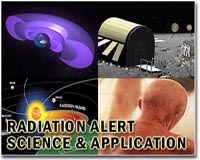 |
Washington (AFP) March 29, 2011 A scare over irradiated food from Japan has sparked a global rush to buy radiation detectors, US dealers said Tuesday, with most reporting they have no more stock to sell. Buyers, especially from Pacific rim countries, are snapping up geiger counters amid worries that radiation from the hobbled Fukushima nuclear power plant is spreading around the world. "Sales are through the roof. We had to suspend orders on our site more than a week ago," said Tim Flanagan, owner of GeigerCounter.com -- which sports a banner, "We are SOLD OUT." "With this crisis, it's just gone through the roof. We're getting calls from all over the world about these meters," said Mike McBride of Industrial Test Systems, which makes two models of radiation testers. It's the same story elsewhere. GS Geiger, which sells a $450 German-made hand-held detector, puts the wait time at four months after a gush of orders. And at Tennessee-based manufacturer SE International, an official said they were too busy working overtime to meet the backlog to talk about it. "We aren't taking any new orders right now," he said. Most of the geiger counters ITS and GeigerCounter.com sold in the past three weeks have gone to Japan and the US West Coast, with the biggest demand from people worried about irradiated food. "Japan exports food to the Pacific Rim and Southeast Asia, and they are concerned about contamination," said Flanagan. Heavy sales on the US and Canadian Pacific coast are also driven by worries of clouds of radiation descending from Japan. They come from hobbyists, manufacturers who import parts from Japan and some people who just distrust the government to tell them the truth, according to McBride. Last week one woman walked into his company's Rock Hill, South Carolina office to buy one to check food she buys in the markets that comes from Asia. "I would consider them scared, or they don't trust the government," he said. Flanagan said that in a normal year he sells about 1,000 detectors, mostly to rockhounds, gemologists, and scientists. In the first five days after the March 11 earthquake and tsunami hobbled the Fukushima plant -- prompting fears of a meltdown in one or more of its reactors -- Flanagan emptied his shelves of 500. Smartphone-sized hand-held models run between $250 and $800, and are easy to use and reliable, dealers say. "They answer the basic question that most people want to know: is this thing radioactive?" said Flanagan. "As soon as you turn them on, they'll actually start clicking or beeping, and that will show background radiation." But a user needs to know that there is always some harmless background radiation, he stressed. He gets a lot of questions about just what level of radiation is dangerous. "A lot of people don't understand is that ... we humans are being bombarded by radiation constantly, mainly of cosmic origin."
earlier related report The regional state weather service said it had conducted tests of the air just outside the city of Vladivostok between Saturday and Tuesday and found small traces of iodine-131. "The appearance of iodine-131 in the air is connected with the accidents at the Japanese nuclear power plants which happened due to the earthquake and tsunami," the weather service said in a statement. "Its concentration is more than 100 times lower that the acceptable level so it does not pose a threat to people's health," it said, quoting its chief Boris Kubai. It added that the concentration of the substance in the air had been declining. The weather service said it continued to conduct the tests. Primorye's capital Vladivostok is located no more than 1,000 kilometres (620 miles) west of Japan's crippled Fukushima nuclear plant. After Japan's March 11 disaster, Russian authorities reinforced radiation controls across the entire Far Eastern region but said radiation levels remain normal and there was no reason for panic.
Share This Article With Planet Earth
Related Links Space Technology News - Applications and Research
 Calm urged as radiation spreads across Asia
Calm urged as radiation spreads across AsiaManila (AFP) March 29, 2011 Small amounts of radiation from Japan's leaking nuclear power plant have spread across Asia, authorities said Tuesday, deepening concerns for millions of people already wary of eating Japanese food. The governments of China, South Korea, the Philippines and Vietnam reported that radiation had drifted over their territories, although they emphasised the levels were so small that there was no ... read more |
|
| The content herein, unless otherwise known to be public domain, are Copyright 1995-2010 - SpaceDaily. AFP and UPI Wire Stories are copyright Agence France-Presse and United Press International. ESA Portal Reports are copyright European Space Agency. All NASA sourced material is public domain. Additional copyrights may apply in whole or part to other bona fide parties. Advertising does not imply endorsement,agreement or approval of any opinions, statements or information provided by SpaceDaily on any Web page published or hosted by SpaceDaily. Privacy Statement |